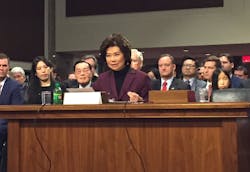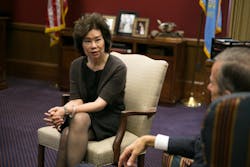Chao, 'ideal candidate' to lead DOT, emphasizes safety, funding innovation
Trucking didn’t get much of a preview of industry-specific priorities for the Trump administration but, if the Senate confirmation hearing for the Transportation Secretary nominee is any indication, whatever the incoming occupant of the White House wants in terms of planes, trains, and automobiles will be capably delivered to Congress by a smooth and well regarded insider.
Indeed, space transportation—and even the relayed well-wishes from Chao’s “dear friends,” several senators’ wives—got more floor time than trucking issues in the Commerce Committee’s three-hour chummy chat with nominee Elaine Chao on Wednesday.
That the hearing provided a platform for committee members to roll out their own transportation wish-lists rather than to challenge Chao’s credentials and President-elect Trump’s plans comes as no surprise: Chao led the Labor Department under George W. Bush and she has held other high-level political appointments. And she’s married to Senate Majority Leader Mitch McConnell (R.-KY), who introduced Chao at the hearing.
In short, she’s the “ideal candidate” to lead the DOT, as Commerce Chairman John Thune said to open the hearing.
For her part, Chao outlined broad goals but offered few details of how DOT under her leadership would achieve them.
“The U.S. Department of Transportation has a rare opportunity to shape the transformation of our critical infrastructure,” she said in her opening statement. “First and foremost, safety will continue to be the primary objective.”
Chao emphasized that infrastructure is the “underpinning” of the U.S. economy—yet the nation’s prosperity is jeopardized by “infrastructure in need of repair, the specter of rising highway fatalities, growing congestion, and by a failure to keep pace with emerging technologies.”
Regarding Trump’s promised trillion-dollar construction program, Chao spoke several times of the need to “unleash the potential for private investment” and to supplement direct federal funding with “innovative financing tools” such as public-private partnerships. She assured the committee that she would keep Congress informed on the administration’s infrastructure plans through “continual and constant dialog,” and that such an ambitious program would be a “heavy lift” requiring bipartisan cooperation with the White House.
As for regulations, federal rules “should be rooted in analysis derived from sound science and data, with risk-based analysis that prevents accidents before they happen, and considers both the costs and the benefits of new rulemakings.”
For trucking specifically, Sen. Deb Fischer pointed to the FAST Act reforms of the Federal Motor Carrier Safety Administration—designed to make the regulatory process “more transparent, responsive, and open to input from stakeholders—and questioned Chao on “the best way” to keep passengers and freight moving across the transportation system, and to prevent DOT regulations from becoming “a burden.”
“The great challenge for all regulators is to balance the ultimate goal of safety, but also to make sure the regulations are based on sound science and true data, and that the underlying analysis is solid,” Chao said.
Fischer added that she looked forward to working with Chao to find solutions to problems such as the truck driver shortage.
With regard to the Trump administration’s position on greenhouse gas regulations, such as the recent Phase 2 regulation of heavy-duty truck emissions, Chao said she was “not very familiar” with current DOT vehicle emissions initiatives and climate change issues.
Not discussed in the hearing, but featured in her questionnaire for nominees, Chao emphasized the “first step” importance of identifying and hiring “the best people possible” for the positions that will be open in incoming administration.
With the transition, several top leadership roles at FMCSA are now open and awaiting political appointees. According to the Plum Book, a directory of administration positions, those top jobs include Administrator, Chief Counsel , Director of Communications, and Director of Congressional Affairs.
FMCSA Spokesman Duane DeBruyne confirmed for Fleet Owner that Deputy Administrator Daphne Jefferson, who serves as the Agency’s senior-ranking career employee—and absent of any temporary executive staffing appointment by the new administration—would automatically assume the both the duties and the full responsibilities of the FMCSA Administrator.
“There is a clear and well established protocol for ensuring a seamless continuity of operations during a change in executive leadership,” said DeBruyne, who has served under four of FMCSA’s five Senate-confirmed administrators since the agency’s establishment in 2000. “Come Monday morning, Jan. 23, 2017, everyone in headquarters and in our service centers and in our field offices will be back at work – focused on truck and bus safety, reducing injuries and saving lives.”
About the Author
Kevin Jones 1
Editor
Kevin has served as editor-in-chief of Trailer/Body Builders magazine since 2017—just the third editor in the magazine’s 60 years. He is also editorial director for Endeavor Business Media’s Commercial Vehicle group, which includes FleetOwner, Bulk Transporter, Refrigerated Transporter, American Trucker, and Fleet Maintenance magazines and websites.

